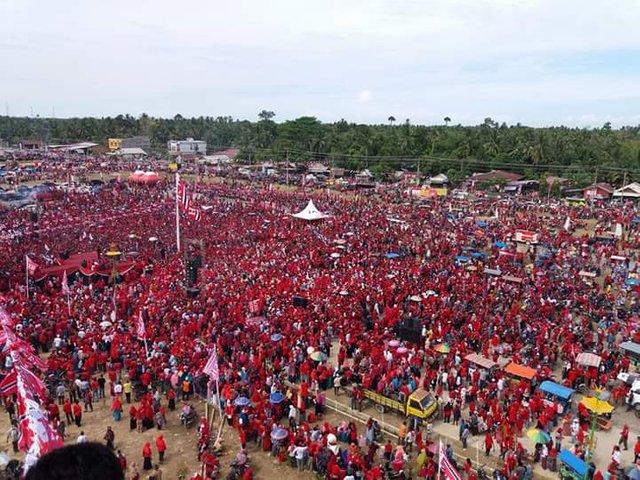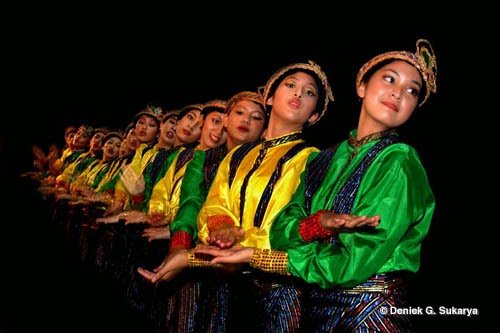Avoid Bureaucracy's Entrapment in Aceh: Switch to customary-based institution?
The winning of local "ex-rebel" party in Aceh election doesn't yet succeed to change much the sociopolitical landscape of community, as the people still have to struggle hard to end their poverty and accessing the worth social services; while these new politician —basically the then freedom fighters — have been shift away from resistance ground toward "pragmatics camp" and became a new oligarchy.
Eventually the pragmatics wave also flooding the civic movement pools, as the prominent of local NGOs leaders —except a few bolden heart for sure— falling into a mere election politics and abandoned initial aims to bring about people toward social justice and legal fairness. As expected, now they act like "other" politician as is, reflecting the identical trend at national Indonesia realm.
Local politicians now are in charged officially in policy making. The question is, does it works?
Looking over the facts, unfortunately we didn't found any progress within Acehnese community. In contrary, the result were the increased of people's poverty, lack of law enforcement specially for conflict victims, deteriorated of environments due to reckless exploitation, and freedom of expression which setback by narrow interpretation of sharia law. What went wrong?

Why local party failed?
Despite a huge poor people's expectation immediately followed the Aceh's ex-rebel party winning in local election, it didn't response properly by the winner with the fast intervention in economic issues. In fact, the ex-rebel deliberately concentrate their efforts to penetrate the bureaucracy in order to put more supporter into govt bodies as much as possible. The issue is, this logic wasn't resulting the improvement within governance. Instead, ex-rebel have to swamp with the classic issue of Indonesia's bureaucracy which known ineffective, conservatives, extravagant in funds and tend to corrupt.
As had diagnosed by experts, most of Indonesian budget always fall upon big numbers of their personnels, rather than go for infrastructure and social service development needs, specially for Acehnese who just have the post-conflict and post-disaster realm. The proportion of government expenditure on personnel salaries versus development has not changed much since the government was win by ex-rebel in 2005, still within the classical range of 60% against 40%.
Ex-rebel seems have no innovation and neglected this issue, even though there is a national call to rationale the bureaucracy number which overburden the budget. Not surprisingly, in the end, despite big chunk of national budget allocated for Aceh province, its disappeared into corruptions; unable to produce significants development of strategic infrastructure and social service in quality. Worse, later Aceh predicated as province with the highest corruption by national anti-corruption organisation.
Corruption alleged here didn't on bureaucracy only, but also on local party called the "Aceh Party (AP)." As the biggest political party in province of Aceh, AP seems need a lot of funds oiling its political machine, the needs which also came from the economic weaknesses exist among their members and supporters that mainly villagers. However, its predictable, since the failure of reintegration project delivered its proper implementation.

Reintegration was one among the whole package of peace agreement between GAM and Government of Indonesia which put an end on decades of Aceh armed-conflict. In practice, initial phase of reintegration took form medical funds delivery for physical and mental health rehabilitated of conflict victims including foreign surgical, extent by disburse of plantations land for former combatants, conflict damaged housing rehab and construction fund, and closing by small grants for economy recovery of conflict victims.
It looks perfect on the papers, but in reality it's only about funds disbursement without necessary assistance. Not surprisingly, the reintegration didn't impact well on conflict victims life improvement.
The hunger of funds also resulted in inner ex-rebel competition for government contract. Its hardened and escalated internal conflict produce a local party cracked into several factions which eventually divided into 2 ex-rebel parties, the Aceh Party (AP) and National Aceh Party (NPA). Both later fighting each others and make their die-hard supporters to retreat their votes; put an ending of the luxury single majority position enjoy before in parliament.
The declined of popularity and electability of local parties was showing by election result in 2014 where the overall local parties only achieve 40.8% (33 out of 81 seats) of parliament compare to previous 2009 election which gave 49.3% (34 out of 69 seats) of parliament vote power. The trend of declined looks to continued, as we didn't find any serious efforts from locals to improve its political and governance performance. We afraid of, it could annihilate the local politics current in self.
What alternative available?
Rather than go for bureaucracy and swamp into its "problematique", better for local parties to go directly for people's need for social changes. The switch from political oligarchy toward strengthening of community-based organisation (CBOs) embracing the customary-law called Adat.
Adat is regulations exist since the Aceh kingdom era, and passing to generation after generation through oral and written traditions, built based on hundred years of Acehnese experienced and serve the people need first. Adats were delivered through adat's organisation considered as descendant and successor of the Aceh kingdom's era governments. Adat's organisation now mostly took form in CBOs.
Put illustration of adat and its institutions services complexity here, there are several organisation involved in public services such are Keujreun Uteun (forestry authority), Keujreun Blang (agriculture authority), Panglima Laôt (sea commanders), Panglima Kawôm (sub-ethnics representation), Haria Peukan (market and tradings authority), Syahbandar (harbour master), Ramaseutia (security authority), Pageu Gampông (neighbourhood watch), ʼ (plantations authority), Tuan Kadie (traditional magistrate), etc.
More details about the advantages and progressive nature of adat Aceh will be written in next posting!
Adat roles only declined after Dutch colonial annexed Aceh since 1904-1942, where colonial reduced the adat and defined it only as "unwritten tradition spicing with myths and regards as non-law." Unfortunately, this colonial narrow paradigm in adat later adopted by Indonesian government which almost killed the overall adat governances. Luckily, peace agreement and post-tsunami reconstruction in 2005 gave adat one more chance to revive.

Aceh's local parties encouraged to strengthening adat and adat organisation may take form of the handover of most bureaucracy roles in government, which considered legal in Aceh due to its authorities of special autonomy granted by central government. The process start from shifting parts of governance roles gradually to adat institution, following with budget allocation, toward what called wide-participatory democracy.
In parallel, local government of Aceh should rationalise the number of bureaucracy toward efficiency, so that end of small bureaucracy will only acts as small professional groups to assist state-run social service bodies, companies owned by governments, development contracts for privates company, and governing roles through adat institutions.
Characterise with its grass-root nature, adat institutions will design its programmes based on community needs —which are the members. Moreover, its parallel with Indonesian national development scheme called "Musrenbang" which required grass-root involvement in development plan making.
More details about this hand-over strategy, will be written in next posting!


back to Mukim
Back to Endatu's value
Sudah lama kita meninggalkan tatatanan warisan tradisi yang lebih baik
Back to the costumary law (adat) is the best solution
Penyeragaman lembaga administrasi pemerintahan menghancurkan tatanan masyarakat tradisional yang telah mengakar ribuan tahun.